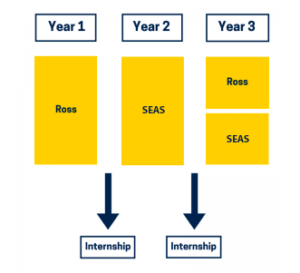Graduate Dual Degree
Frequently Asked Questions
As you navigate the application process as a prospective Erb graduate dual-degree student, you might have a few questions. Read through this list of FAQs for some guidance through the process. If you still have questions, contact us!
Frequently Asked Questions
Admissions
What is the application process for the Erb MBA/MS Program?
Applicants should indicate on both applications their interest in and intention of joining the Erb Institute.
Application requirements include: GMAT or GRE scores, official transcripts from other academic institutions, application essays, letters of recommendation and a resume. You may be invited for an interview at Ross after your application is filed. It’s important to remember that you’re applying to both Ross and SEAS for admissions into their programs independently. You should tailor your applications to each appropriately.
Should I apply to both schools at the same time? Can I apply to one school first, and then the other once I’m in Ann Arbor as a student?
Do I need a science or business undergraduate degree to apply to Ross and/or SEAS?
I am an international student. How do I apply?
Frequently Asked Questions
Program
What courses do Erb students take?
Students enrolled in the dual-degree program must take the core required courses at both SEAS and Ross. SEAS students also need to determine a track of study (see the full list of SEAS tracks here). Once students in both schools fulfill their core requirements, they may choose to enroll in elective courses. In addition to the core courses of the MBA and MS degrees, Erb Institute students are required to enroll in Erb on the Road, a course designed exclusively for first-year Erb students. The course introduces a carefully selected set of sustainability issues and management tools that sustainability professionals should understand before entering the marketplace. The course also provides a framework for career visioning in sustainability.
What types of internships are available to Erb students during their graduate studies?
Because the Erb Institute dual degree is a 2.5- or 3-year program, students have time for two summer internships. Erb students can use both Ross Career Services and SEAS Career Services during their efforts. The Erb Institute also assists with any additional searches off campus or within our business network. The Erb Institute Student Advisory Board regularly holds career workshops throughout the year, which help to connect current students with alumni and board members to help navigate the process.
What does “Erb” stand for?
The Erb Institute is named after Frederick A. and Barbara M. Erb, who founded the Institute in 1996 and have provided vital support and contributions in the ensuing years. Click here for more information regarding the founders.
If I get accepted to both schools, which school should I start in?
Erb students can start at either the School for Environment and Sustainability or Ross during their first year. Historically, most students have opted to start at SEAS, but in recent years, an increasing number of students are choosing to start at Ross. Because Erb is an interdisciplinary program, students may take courses in and access all the resources at both schools, even when they’re primarily enrolled in only one. It’s recommended that you talk with the Erb Institute Managing Director, Terry Nelidov, as well as your fellow incoming Erbers as you’re making your decision.
The following is a sample timeline for Erb students, but it’s important to remember that there is flexibility in your academic schedule.
